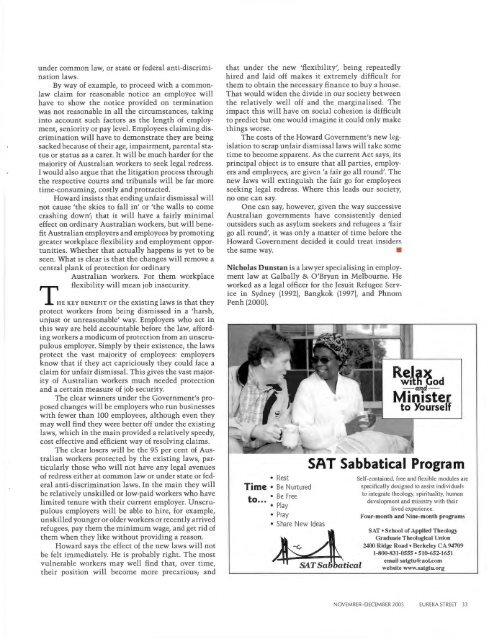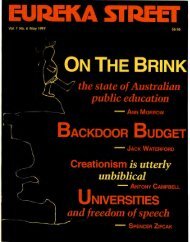0 - Eureka Street
0 - Eureka Street
0 - Eureka Street
Create successful ePaper yourself
Turn your PDF publications into a flip-book with our unique Google optimized e-Paper software.
under common law, or state or federal anti-discrimination<br />
laws.<br />
By way of example, to proceed with a commonlaw<br />
claim for reasonable notice an employee will<br />
have to show the notice provided on termination<br />
was not reasonable in all the circumstances, taking<br />
into account such factors as the length of employment,<br />
seniority or pay level. Employees claiming discrimination<br />
will have to demonstrate they are being<br />
sacked because of their age, impairment, parental status<br />
or status as a carer. It will be much harder for the<br />
majority of Australian workers to seek legal redress.<br />
I would also argue that the litigation process through<br />
the respective courts and tribunals will be far more<br />
time-consuming, costly and protracted.<br />
Howard insists that ending unfair dismissal will<br />
not cause 'the skies to fall in' or 'the walls to come<br />
crashing down'; that it will have a fairly minimal<br />
effect on ordinary Australian workers, but will benefit<br />
Australian employers and employees by promoting<br />
greater workplace flexibility and employment opportunities.<br />
Whether that actually happens is yet to be<br />
seen. What is clear is that the changes will remove a<br />
central plank of protection for ordinary<br />
Australian workers. For them workplace<br />
flexibility will mean job insecurity.<br />
T HE KEY BENEFIT OF the existing laws is that they<br />
protect workers from being dismissed in a 'harsh,<br />
unjust or unreasonable' way. Employers who act in<br />
this way are held accountable before the law, affording<br />
workers a modicum of protection from an unscrupulous<br />
employer. Simply by their existence, the laws<br />
protect the vast majority of employees: employers<br />
know that if they act capriciously they could face a<br />
claim for unfair dismissal. This gives the vast majority<br />
of Australian workers much needed protection<br />
and a certain measure of job security.<br />
The clear winners under the Government's proposed<br />
changes will be employers who run businesses<br />
with fewer than 100 employees, although even they<br />
may well find they were better off under the existing<br />
laws, which in the main provided a relatively speedy,<br />
cost effective and efficient way of resolving claims.<br />
The clear losers will be the 95 per cent of Australian<br />
workers protected by the existing laws, particularly<br />
those who will not have any legal avenues<br />
of redress either at common law or under state or federal<br />
anti-discrimination laws. In the main they will<br />
be relatively unskilled or low-paid workers who have<br />
limited tenure with their current employer. Unscrupulous<br />
employers will be able to hire, for example,<br />
unskilled younger or older workers or recently arrived<br />
refugees, pay them the minimum wage, and get rid of<br />
them when they like without providing a reason.<br />
Howard says the effect of the new laws will not<br />
be felt immediately. He is probably right. The most<br />
vulnerable workers may well find that, over time,<br />
their position will become more precarious; and<br />
that under the new 'flexibility', being repeatedly<br />
hired and laid off makes it extremely difficult for<br />
them to obtain the necessary finance to buy a house.<br />
That would widen the divide in our society between<br />
the relatively well off and the marginalised. The<br />
impact this will have on social cohesion is difficult<br />
to predict but one would imagine it could only make<br />
things worse.<br />
The costs of the Howard Government's new legislation<br />
to scrap unfair dismissal laws will take some<br />
time to become apparent. As the current Act says, its<br />
principal object is to ensure that all parties, employers<br />
and employees, are given 'a fair go all round'. The<br />
new laws will extinguish the fair go for employees<br />
seeking legal redress. Where this leads our society,<br />
no one can say.<br />
One can say, however, given the way successive<br />
Australian governments have consistently denied<br />
outsiders such as asylum seekers and refugees a 'fair<br />
go all round', it was only a matter of time before the<br />
Howard Government decided it could treat insiders<br />
the same way.<br />
•<br />
Nicholas Dunstan is a lawyer specialising in employment<br />
law at Galbally & O'Bryan in Melbourne. He<br />
worked as a legal officer for the Jesuit Refugee Service<br />
in Sydney (1992), Bangkok (1997), and Phnom<br />
Penh ( ~2000).<br />
• Rest<br />
Time • Be Nu rtu red<br />
to ...<br />
• Be Free<br />
• Play<br />
• Pray<br />
• Share New Ideas<br />
ReJax d<br />
wttll-Go<br />
- and -<br />
Minister<br />
to Yourself<br />
SAT Sabbatical Program<br />
Self-contained, free and fl ex ible modules are<br />
spec ifically designed to as sist individuals<br />
to integ.rate theology, spirituali ty, human<br />
devel opment and ministry with their<br />
li,·ed ex peri ence.<br />
Four-month and Nine-month prOj:,'l'ams<br />
SAT • School of Applied Theology<br />
Graduate Theological Union<br />
2400 Ridge Road • Berkeley C.-\ 94709<br />
1-800-831-0555.510-652-1651<br />
email satgtu
















